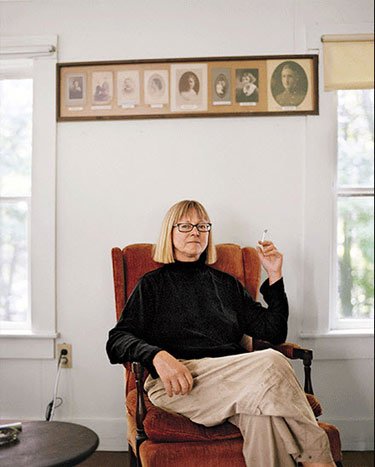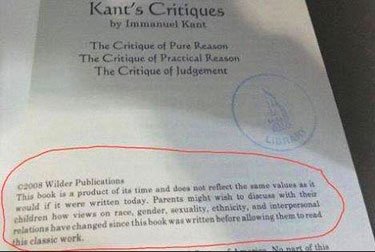Category Archive 'Publishing'
26 Oct 2022


Go to a bookstore these days or read Lithhub or the latest New Yorker or Paris Review and you will soon begin to think that literature consists of the life narratives, fantasies, and collected grievances of female neurotics, homosexuals, and oppressed persons of color.
As Aristophanes, at The Federalist, describes: the publishing industry has overwhelmingly gone Woke.
Even big-name authors now admit the publishing industry has gotten intolerably woke and hostile to men — it’s time for readers to fight back.
Joyce Carol Oates is a fixture in American letters — she’s won the National Book Award, two O. Henry Awards, the National Humanities Medal, the Jerusalem Prize, and she’s been nominated for the Pulitzer five times. She taught at Princeton for 36 years, and is, of course, an outspoken Trump critic. A Google search for “Joyce Carol Oates” and “feminist” yields more than half a million results.
And even she thinks the publishing industry has become intolerably politically correct. On Twitter, she recently observed, the “category of straight white males is the only category remaining for villains & awful people in fiction & film & popular culture.” Oates isn’t alone in observing the problem — in June, ubiquitous author James Patterson, whose potboilers have sold more than 400 million copies, said white male writers now face “another form of racism” in the woke publishing industry, before he was bullied into backtracking on his comments.
Of course, if you’ve set foot in a large bookstore recently, what Patterson is saying has obvious merit. On a recent trip to Barnes & Noble, a friend actually took photos and counted up the books on the six new fiction shelves displayed up front. Male authors made up less than 25 percent of the nearly 200 books displayed in the front of the store, and obviously, the percentage of men who were white and/or heterosexual was notably smaller than that.
Oates and Patterson are only now saying what many men with literary ambitions have long known. Iowa Writers Workshop graduate Alex Perez recently gave a scorched-earth interview to the Hobart Literary Journal where he discussed how male-centric literature was being deliberately shut out of publishing. During the interview, he had some choice words for the woke and disproportionately female gatekeepers of the industry:
These women, perhaps the least diverse collection of people on the planet, decide who is worthy or unworthy of literary representation. Their worldview trickles down to the small journals, too, which are mostly run by woke young women or bored middle-aged housewives. This explains why everything reads and sounds the same, from major publishing houses to vanity zines with a readership of fifteen. The progressive/woke orthodoxy is the ideology that controls the entire publishing apparatus.
Almost to prove his point, most of the editors of the Hobart Literary Journal resigned in protest over the decision to publish Perez’s interview. As for Perez, he’s mostly given up on his literary ambitions to write cultural and political commentary for publications that don’t neatly hew to center-left orthodoxies, such as Tablet.
The people running publishing have fully confused their profession with their secular religion. Perez isn’t just right that “everything reads and sounds the same,” but the greater crime is that when literature is culturally and politically homogenized, greatness becomes an outlier. The next Cormac McCarthy could be languishing because they were too busy greenlighting “Anti-Racist Baby.”
RTWT
HT: Karen L. Myers.
15 Jul 2016


Helen DeWitt
Helem DeWitt’s first novel, The Last Samurai, made a big splash when it was published, but the author had publishing problems. Time has gone by, and she is not yet rich. In fact, she is so broke that she is struggling with a dying laptop she cannot afford to replace, and when she tried to donate a second time to Bernie Sanders recently, her credit card was declined.
Christian Lorentzen, describes the author’s hard luck story in New York Magazine, reprinted by Vulture:
The Last Samurai was a sensation even before it appeared. The toast of the Frankfurt Book Fair in 1999, with rights sold to more than a dozen countries, the novel came out in 2000 to wide acclaim, sold in excess of 100,000 copies in English, and was nominated for several prizes. But for DeWitt, this was the beginning of a long phase of turmoil that still hasn’t abated. The book’s success was marred by an epic battle with a copy editor involving large amounts of Wite-Out; typesetting nightmares having to do with the book’s use of foreign scripts; what she describes as “an accounting error†that resulted in her owing the publisher $75,000 when she thought the publisher owed her $80,000; the agonies of obtaining permissions for the many outside works quoted in the novel, including Akira Kurosawa’s The Seven Samurai — which was the title of The Last Samurai until it was deemed legally impossible. …
When DeWitt talks about her artistic breakthroughs, she has a way of quickly turning to her travails with the publishing industry. “Of course, at that point I had never talked to an agent, so I had never had the kind of conversation where you have some hotshot agent saying, ‘No publisher will allow that.’ †DeWitt had earlier compared publishing to the pharmaceutical industry: The way drug companies suppress negative trial results in her view is similar to the way agents’ and editors’ failed deals are never reported, nor the way they stifle literary talent in the cradle. “There could be all these people out there having these ideas and being told, ‘No, no, no, no.’  
DeWitt has a keen interest in David Foster Wallace. The two writers have some important things in common: a rigorous academic background, an aesthetic of fracture, suicide as subject matter. She believes that if all had gone as smoothly as it could have with the publication of The Last Samurai, it would have been in the cohort of Infinite Jest. I took this to mean that she would have been considered a rival to Wallace and Jonathan Franzen for the unofficial title of Greatest American Novelist of Her Generation. Instead she sees herself as a writer who hasn’t yet fully emerged. “Plato did not have an editor,†she said. “Plenty of writers that we admire struggled along somehow without the help of Michael Pietsch,†referring to the editor of Infinite Jest. But it seemed to me that for all she had against the publishing world, DeWitt was still looking for a savior to rescue her — not unlike Ludo looking for a father. She disagreed: All she needed was a competent partner to put her books out without screwing them up and to pay her an advance she could survive on. (She had nice things to say about New Directions, but its advances are small.)
29 Jun 2015

They are a sleazy operation and have been put putting these warning labels into their reprints for years.
24 Jan 2014


It’s always entertaining to read about the corporate decisions which lost former industry leading products their place in the sun. Quark used to have a 95% market share.
Ars Technica:
Anecdotal evidence is not the best way to objectively study anything, but ask anyone what caused them to leave XPress for InDesign. Overwhelmingly, it all boils down to those personal stories of neglect that eventually eroded Quark’s appeal and made a potentially painful transfer to another product the lesser of the evils.
In 2001, Apple released OS X, which felt dog slow on existing hardware. Despite its inclusion of crucial publishing tech like AppleScript and ColorSync, it was definitely not production-ready. But OS 9’s failings are well documented—a bad font in an ad could literally cost you a third of your day dealing with system crashes. OS X’s single promise of Unix-like stability turned its other short-term problems with snappiness into non-issues.
Quark repeatedly failed to make OS X-native versions of XPress—spanning versions 4.1, 5, and 6—but the company still asked for plenty of loot for the upgrades. With user frustration high with 2002’s Quark 5, CEO Fred Ebrahimi salted the wounds by taunting users to switch to Windows if they didn’t like it, saying, “The Macintosh platform is shrinking.” Ebrahimi suggested that anyone dissatisfied with Quark’s Mac commitment should “switch to something else.”
It’s advice people apparently took—just not the way he meant it. It was likely that Quark saw increasing growth in Windows sales as a sign that the Mac publishing market was dwindling. However, what they were probably seeing was new users, not migration to Windows. I’ve heard about Windows-based publishing environments, but I’ve never actually seen one in my 20+ years in design and publishing.
Perhaps this seems like an overstatement, but desktop publishing was invented on the Mac. It would have been hard to find people more rabidly pro-Mac than people who were basically keeping pre-Jobs Apple afloat. So when a revitalized Apple needed all the help it could get, telling Mac designers to switch to Windows was all the excuse these creatives needed to think that the grass was actually greener on the InDesign side. Simply put, this was a crucial nudge for many.
Read the whole thing.
Your are browsing
the Archives of Never Yet Melted in the 'Publishing' Category.
/div>

Feeds
|







